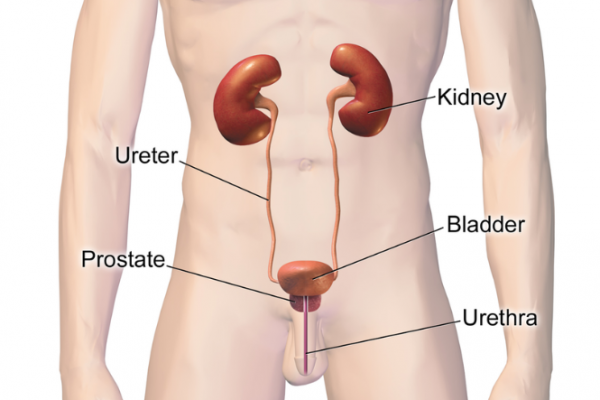You can now add Healthify as a preferred source on Google. Click here to see us when you search Google.
Urinary tract infection (UTI) in men | Pokenga pūaha mimi
Key points about urinary tract infections in men (UTIs or pokenga pūaha mimi)
- Urinary tract infections can affect any part of your urinary system. This includes your kidneys, ureters, bladder and urethra.
- UTIs are rare in men under the age of 50 but are more common in older men.
- Symptoms of a UTI include burning or pain when peeing, and needing to pee more often and more urgently.
- All symptoms of a UTI should be checked by a healthcare provider.
- If the infection affects your kidneys it’s known as pyelonephritis. This isn’t common but needs urgent medical care.
- UTIs can be treated with antibiotics.

A urinary tract infection (UTI) is a bacterial infection in any part of your urinary system. Your urinary system includes the parts of your body that make and release urine (pee). These include your:
- kidneys, which filter your blood to remove waste and extra water to make urine (pee)
- ureters, which are thin tubes of muscle, one on each side of your bladder, which transport urine from your kidneys to your bladder
- bladder, which stores urine until you need to pee
- urethra, which is a tube that carries urine from your bladder out of your body when you pee.
UTIs are less common in men than in women because men have a longer urethra so bacteria have a harder time travelling up to the bladder. However, UTIs become more common in men over 60 years of age because of underlying conditions, such as prostate enlargement.
When the infection is just in your bladder (cystitis) and/or urethra (urethritis), it’s called a lower UTI. If it travels upwards to one or both of your kidneys, it’s called an upper UTI or pyelonephritis. An upper UTI can be more serious than a lower UTI as your kidneys can become damaged by the infection. Find out more about kidney infection (pyelonephritis).
All symptoms of a UTI should be checked by a healthcare provider.

Image credit: BruceBlaus via Wikimedia Commons(external link)
Most urine infections in men are caused by bacteria (bugs) from your bowel. Bacteria don’t cause any problems in your bowel but can be harmful if they get into other parts of your body. Bacteria left around your back passage (anus) after you poo (pass faeces) can get into your urethra and bladder and multiply to cause infection.
Because urinary tract infections (UTIs) are less common in men, there’s more likely to be an underlying problem, such as a problem with your bladder, urethra or prostate that stops you from passing pee or emptying your bladder completely.
Things that can increase the risk of men getting a UTI include:
- being over 60 years of age
- problems with the structure of your kidneys, ureters, bladder or urethra
- an enlarged prostate
- having a urinary catheter
- having unsafe sex
- radiation therapy which can irritate the lining of the bladder.
- a poor immune system, diabetes or kidney failure
- kidney problems, such as kidney stones
- having had a previous UTI
- having a condition that makes it difficult to fully empty your bladder, such as constipation.
A sexually transmitted infection (STI), such as chlamydia, may cause inflammation of the bladder (cystitis) and symptoms similar to a UTI.
- pain or burning during, or immediately after, peeing – this is called dysuria
- needing to pee more often than usual during the night – this is called nocturia
- pain in your lower tummy (abdomen)
- feeling the need to pee more often
- needing to pee without much warning
- urine that smells bad or looks cloudy or reddish.
Symptoms of a kidney infection (pyelonephritis), can include the symptoms listed above as well as pain in your loin (the side of your lower back over your kidney), fever, feeling or being sick (vomiting), or feeling generally unwell.
Older men may have no urinary symptoms or fever. Often the only symptoms are being more muddled, sleepier, having accidental urine leakage (incontinence) poor appetite, or feeling generally unwell. Confusion and sleepiness can put older adults at risk of falls.
If you have UTI symptoms you should see a healthcare provider. You may have a lower UTI (cystitis or urethritis) or you may have another condition, such as a sexually transmitted infection (STI), prostatitis or a kidney infection.
- a very high temperature, or feeling hot and shivery
- a very low temperature (below 36º C)
- confusion, drowsiness or difficulty speaking
- you haven't been for a pee all day
- have pain in the lower tummy or in the back, just under your ribs
- blood in your pee.
These symptoms suggest a kidney infection, which can be serious if it's not treated quickly.
To diagnose a urinary tract infection (UTI), your healthcare provider will examine you and ask questions about your symptoms and general health. Sometimes that might be enough to diagnose a UTI. They may ask you for a urine sample to find out what bacteria is causing the infection.
If your healthcare provider suspects an underlying problem, or if you’ve had more than one UTI, other tests may include blood tests, checks for sexually transmitted infections (STIs), examination of your prostate gland and scans of your bladder or kidneys.
Lower urinary tract infections (UTIs), such as bladder infections (cystitis), are treated with antibiotics to relieve your symptoms, get rid of the infection and reduce the risk of it spreading to your kidneys and causing pyelonephritis. It's important to finish the whole course of treatment even if you start to feel better before you’ve taken all of your antibiotics.
If a urine sample is being tested, antibiotics can be started while you’re waiting for the results.
If your symptoms continue for more than 2 days after starting treatment, or you get worse, see your healthcare provider as soon as possible in case you need a different antibiotic or the infection has spread to your kidneys. An upper UTI or kidney infection needs to be treated urgently with antibiotics which may need to be given intravenously (through a vein in your arm). Read more about the treatment for kidney infections.
If you have recurrent UTIs (you keep getting them), or you’re at higher risk of complications, you may be prescribed a low-dose antibiotic to take for a few months. How long you need to take the antibiotic depends on how often you get the UTIs. Read more about recurrent UTIs.
- Take your antibiotics as prescribed. Take the full course of treatment.
- Take paracetamol or ibuprofen (if it's safe for you) for pain.
- Drink plenty of water so you don't get dehydrated. This helps to flush out the bacteria.
- Some people find that drinks such as coffee, alcohol, fizzy drinks and very acidic juices (eg, orange juice) can make bladder symptoms feel worse. So you may choose to reduce or avoid them while you're uncomfortable.
- Some people try products that make their urine less acidic (called urinary alkalinisers such as Ural) to ease urinary discomfort. Urinary alkalinisers don't treat the infection and there is some concern that they may reduce the effect of some antibiotics commonly used to treat UTIs. Talk to your healthcare provider to see if this treatment is right for you.
- Drink plenty of fluids to avoid dehydration.
- Don't 'hold on' if you feel the urge to pee.
- Try to empty your bladder fully when you pee. Try sitting when you pee or peeing twice to make sure your bladder is empty.
Symptoms of a urinary tract infection (UTI) usually improve within a few days of starting antibiotic treatment. If your symptoms don’t improve you may need a different antibiotic or you may be referred to a urology specialist for further investigation.
However, a lower UTI may spread to your kidney (pyelonephritis) or prostate gland (prostatitis) and cause more serious symptoms.
Most men don’t get further UTIs, but if you get 1or 2 more within a 6-to-12-month period, these should be investigated to try and find out if there’s an underlying cause.
Urinary tract infection in older people(external link) Patient Info, UK
UTIs and delirium(external link) Alzheimer’s Society, UK
References
- Urinary tract infections (UTIs) – an overview of lower UTI management in adults(external link) BPAC, NZ, 2025
- Urinary tract infections (UTIs)(external link) NHS, UK, 2025
- Lower UTI in Men(external link) Canterbury HealthPathways, NZ, 2025
- UTI in Men (external link) 3D Lower North Island HealthPathways, NZ, 2021
- Urine infection in men(external link) Patient Info, UK, 2024
- Cystitis in men(external link) Patient Info, UK, 2023
- Schuppe HC, Pilatz A, H Hossain, et al. Urogenital infection as a risk factor for male infertility(external link) Dtsch Arztebl Int. 2017 May 12;114(19):339–346
See the section on UTIs in the urinary topics for healthcare providers page.
What are symptoms of a UTI in men?
Symptoms of a urinary tract infection (UTI) in men include pain when peeing, peeing more often than usual, needing to pee without much warning, pain in the lower tummy, cloudy, bloody or smelly pee and fever. If you have a kidney infection, you may have pain in your loin (the side of your lower back over your kidney), fever, nausea or vomiting (feeling or being sick). Older men may just feel generally unwell or may be confused and sleepy. You may also have prostate symptoms if you have an underlying prostate condition, such as prostate enlargement.
All symptoms should be checked by a healthcare provider.
Why do I keep getting UTIs?
Recurrent UTIs in men are uncommon and often suggest an underlying condition. This could be a prostate problem, or a problem with the structure of your kidneys, ureters, bladder or urethra, which needs to be investigated by a urology specialist. You may also be dehydrated, which can increase the risk of UTI, so aim to drink plenty of fluids.
Can UTI in men cause infertility?
A simple uncomplicated UTI in men doesn’t usually cause infertility. However, if the infection spreads to your reproductive organs or becomes chronic it can affect fertility in some cases. It’s important to get a UTI treated promptly to reduce the chance of this.
Credits: Healthify editorial team. Healthify is brought to you by Health Navigator Charitable Trust.
Reviewed by: Dr Grace Lee, FRNZCGP and Clinical Educator
Last reviewed:





